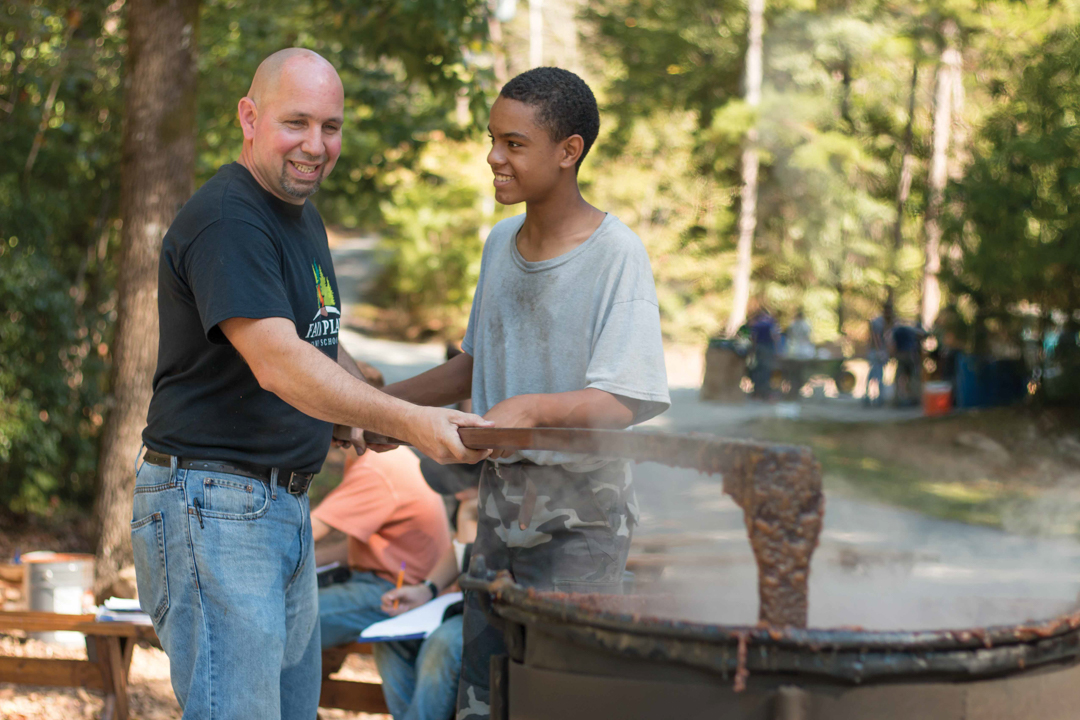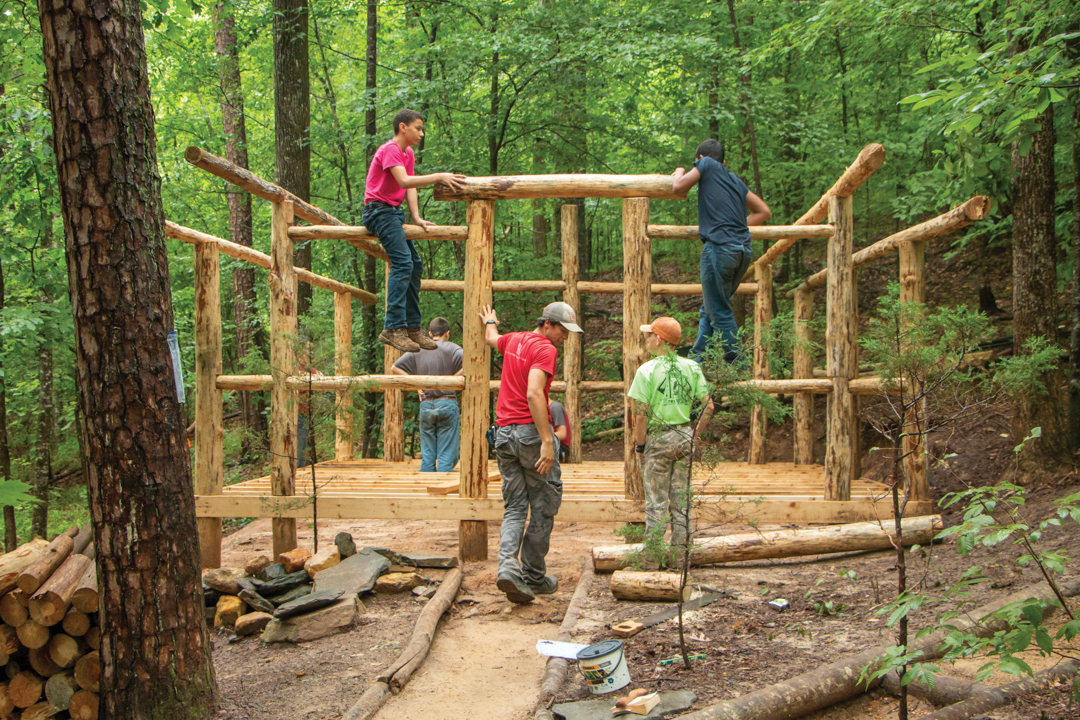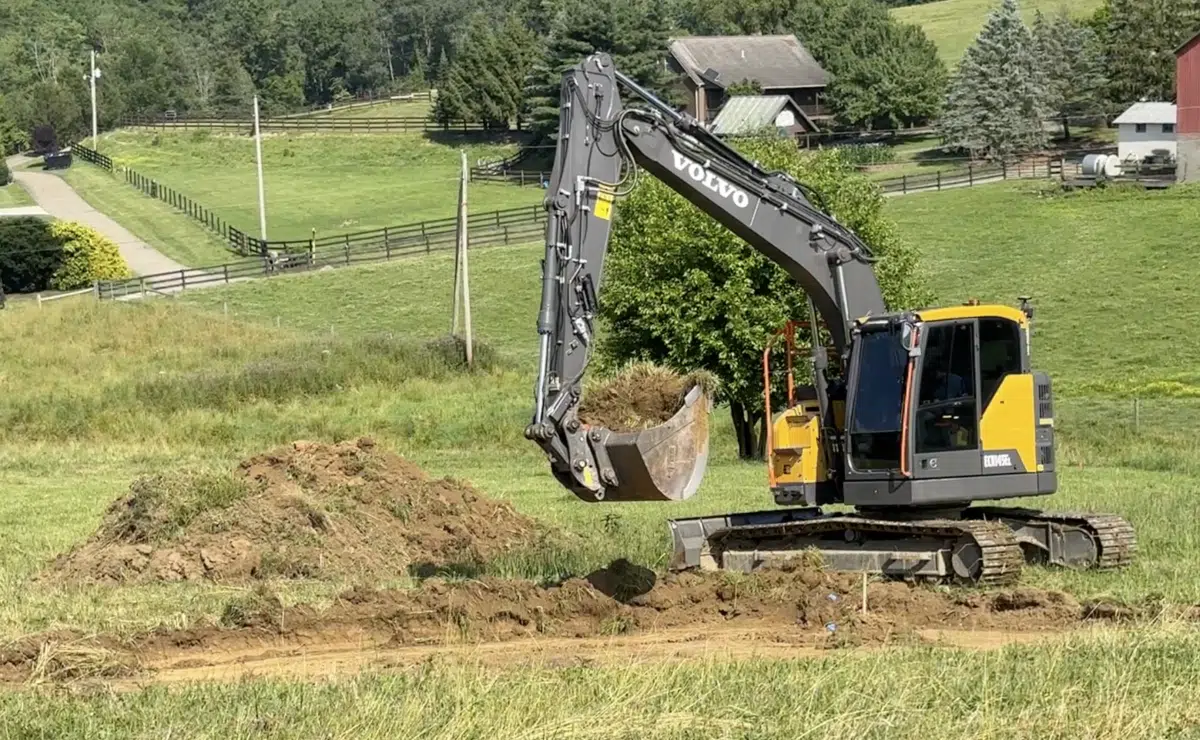Fair Play Camp School
words by: Reuben Shetler
____________________
The morning sun peeps over the horizon in South Carolina. It rises slowly over Oconee County, bringing the promise of a fresh, new day. Golden sunbeams probe through the trees of the Blue Ridge Mountains. A fine mist rises out of the forest. A blue jay screams, announcing to the woodland creatures, “Time to wake up! Spring is in the mountains!” Oconee County is paradise on Earth.
There’s a group of woodland creatures that have already been up for several hours. In single file, they descend the mountain. Ten boys, led by two young men, are on a morning hike. They march down a rugged path, silently watching the woodpeckers and warblers flit through the trees. They cross a stream, jumping from one rock to another. And then they’re back at camp.
The Frontiersmen, led by Jared Stoltzfus, are ready for a new day at Fair Play Camp School. A new day of learning, responsibility, and developing skills that will benefit them the rest of their lives.
About Fair Play
Daniel Hochstetler, Executive Director of Fair Play (also known as “Head Chief”), emerges from his house on the premises of camp. Daniel is married, has five children, and has been director since 2014. He’s on his way to camp headquarters for morning devotions.
Fair Play Camp School was started in 1981 by Floyd Yoder and his father. When he was a young married man, Floyd lived near a camp for troubled boys in Virginia. Floyd thought camp was a great place, but it wasn’t founded on the gospel of Jesus Christ. So Floyd decided to start his own boys camp, a Christian camp. His dream became reality when he received the opportunity to purchase 500 acres in the foothills of the Blue Ridge Mountains in South Carolina. Fair Play was born, a camp that has hosted over 1,000 boys in its 40 years of operation.
Camp is for boys, ages 8 to 17, who are experiencing behavior/emotional problems and have a desire to change. They are placed in one of four campsites, the Frontiersmen, Explorers, Trailblazers, or Pioneers. Each camp has ten boys, and two counselors who are referred to as “chiefs.”
“Camp has two rules,” Daniel says. “Rule one: everything we do, we do as a group. Each group of ten boys always sticks together. Rule two: everything we do, we do with a good attitude.”
These two rules are the fundamentals of the experience that shapes boys into men. They learn how to interact with each other, how to communicate, and how to live unselfishly. And, they learn they are helping themselves when they help others. “We all have things we can improve,” Daniel says. “We all have skills within ourselves to help others. But we also have to be willing to accept criticism.”
Fair Play is located in a wilderness setting. “It’s a very simple atmosphere, where people need each other,” Daniel explains. “There are very few distractions in this environment. It’s like America 150 years ago. At that time, the quality of your life depended on your relationships with your neighbors. That’s what Fair Play is all about. What’s important is your relationship with God and each other, and how we choose to help each other.”
Daniel pauses to look over the campsites. The boys are bustling about like a colony of ants. “We have this saying,” Daniel says. “We’re not going to do anything to a boy, or for a boy, but we’re going to do everything with a boy.”
He continues, “Camp is a place of healing and hope. So many young boys have experienced hurts and need a place to restart. Our goal here is to be Christian mentors. We have a great opportunity to show boys how a godly man should live.”

Camp Operations
Jared Stoltzfus grew up with Fair Play ingrained into his childhood. “When I was a kid, Dad would sing camp songs to me when he put me to bed.” Jared’s dad was a chief at Fair Play soon after the camp started. Then Jared’s uncle became a chief as well.
“After he finished his time at camp, my uncle decided to live in South Carolina. When I was a boy, we would visit my uncle, and sometimes we’d go see camp. It became super close to me,” Jared relates. He decided to follow in the family footsteps. In the fall of 2015, Jared became a chief at Fair Play.
“Being a chief is one of the most worthwhile things a young man can do,” Jared says. “A chief will serve for two years. A typical boy who attends camp will be there for a year and a half. So, what’s unique is there are always new boys coming in, and there are always boys who are almost ready to leave. As a chief, the boys that start the same time as you do are extra special. You develop a connection with them because you interact with them the longest.”
Jared loves watching the boys grow. The boys who are at the end of their term will reach out a hand to those who are just beginning. “A peer can talk to someone who just came. It makes you get past yourself and your problems. Most boys are closed up, or explosive. They’ve never talked about their hurts. At camp, they open up, and it changes their lives. In general, a lot of these boys come from broken homes and have no father figure. Their adoptive parents may think they can love them out of their hurts, but sometimes it may take another step.”
Cole arrived at camp as a little boy and left as a young man. He was very immature. When things didn’t go his way, he threw a temper tantrum. He screamed and yelled. He was overweight, and the outdoors was not the place for him. Cole was used to playing video games, and not much else.
During his time as a chief, Jared built a relationship with Cole. He saw an extremely intelligent young boy. Slowly, Cole began to exercise his leadership capabilities. He came full circle on taking care of himself. He loved to plan camp activities, and he became a mentor to other boys. He learned to freely express himself. “Cole went from having no respect,” Jared recalls, “to being a leader.”
Jared is a chief for the Frontiersmen. This particular morning, they are building a tent in their campsite. The boys run into the forest and cut down three small pine trees. They drag them back to camp. Two boys begin hacking off branches. Another two use knives to peel off bark. The rest of the group is bent over a blueprint, figuring out the next step.
Daniel joins the scene. “Each boy is responsible for his own tent,” he explains. “We help him create a blueprint to build it. He learns engineering, using math, and reading a tape measure. Then the entire group assists in building the tent, usually out of pine trees. After that, the boys are responsible to maintain it. They clean their own tents. They fix leaks. Their tents are their domain, the property for which they are fully responsible.”
The Explorers are making firewood. Again, it’s a group effort. Some are cutting, some are splitting, some are carrying, some are stacking. “Firewood is their focus this week,” Daniel says. “Next week they’ll move on to something else.”
It’s Tuesday, so the Trailblazers are sitting in a circle planning their activities for the following week. The boys work together to make sure the schedule makes sense. Next Tuesday they will plan the week after that.
The Pioneers are preparing a menu. Two days a week, each group cooks their own food. They have six menus to prepare: two for breakfast, two for lunch, and two for supper. The boys have a certain quantity they can spend per menu. They create a list of ingredients, which are purchased for them by the camp cooks.
Daniel laughs. “If they plan to have pancakes, but forget to get maple syrup, then there’s just no syrup! The boys learn their decisions have direct consequences. They learn to be self-sufficient, and to think things through.”
Each day, the boys get up at 6:30. They make their beds, do campsite chores, then have devotions. On Sundays, the entire Fair Play team has chapel together. Five days a week, the entire camp eats together in a dining hall called Chuckwagon.
“We try to make things fun,” Daniel says. “We go fishing. We play games. We go on canoe trips. When we’re working together, and taking care of each other, it’s just like a family.”
Of course, families can have problems. And problems arise at Fair Play. But when an issue comes up, the group will stop and talk about it. If someone is angry, normal activities will not resume until the issue is resolved.
Every six weeks, the boys go home for 4-5 days. This gives them the opportunity to exercise the things they’ve learned, in real life. Then they return to camp to learn more.
“No two days are alike at Fair Play,” Daniel says. “But we try to work through things the best we can. Hopefully, these boys will go on to apply these principles in their schools, their churches, and when they grow up, their businesses and homes.”
Around the Campfire
It’s evening. The boys in camp sit around campfires to evaluate their day. The flames flicker and dance, creating moving shadows on their faces.
The sound of laughter and happy conversation drifts into the woods. A barred owl calls, and spring peepers serenade the creeks and bogs in the lowlands. The air is alive with fireflies. Another day at Fair Play has come to an end.
There’s nothing like sitting around the campfire, talking about life. And it also is a time of reflection. Daniel watches his current campers talk and interact, and his mind floats back to boys of the past.
Jordan came to camp when he was 12. Recently he called Daniel and said, “I’ve been thinking about camp a lot these days. Man, can I just come back? I miss that place.” The memories made stick with the boys the rest of their lives.
Hudson grew up in an orphanage in Ukraine. He got adopted, but his new family had little hope for him. They sent him to Fair Play. Now, he’s a senior in high school. He’s running cross-country, and he has a full-time job and a savings account. And Hudson’s family is excited about his future.
Daniel stares into the flames and ponders. He knows that many of the boys’ families consider the chiefs at Fair Play to be heroes. But who are the heroes? The heroes are the boys themselves. The boys, and everyone outside of camp who help make camp possible.
- Fair Play Camp School
- Fair Play Camp School
An Answered Prayer
Curt Yoder is an associate board member for Fair Play. He also is an answer to a prayer.
Curt lives in Ohio, and he is the owner of Ashery Country Store near Mt. Hope. “When I was 19, one of my friends was a chief at Fair Play,” Curt shares. “I took a tour of camp, and I was impressed. I wanted to help camp in some way, but at that time I was dating and had marriage on my mind.”
That marriage happened, and Curt wasn’t able to be a chief at Fair Play. But he never forgot.
Curt’s father passed away in 2004. Two years later, Curt joined a men’s group that offered support to one another. One session, a question came up. “What is a dream you never pursued?” Curt told the group about his desire to help Fair Play when he was a young man. Then another question came up. “What’s holding you back from still helping them now?”
So, Curt arranged a meeting with Judson Schrock, a former administrator at camp. “Hey, can we start supporting you in some way?”
Judson couldn’t believe what he was hearing. Fair Play was going through some financial struggles, and they were at the point where they almost didn’t have the funds to keep operating.
Putting a boy through camp is quite costly. But when someone contacts Fair Play with a request to send a boy, Daniel doesn’t talk about money. He says, “Tell me about your son.” Fair Play will accept any boy seeking help, regardless of how much his family can pay.
Fair Play has two local thrift stores that donate their proceeds to camp. These stores, plus contributions from the boys’ families, cover about half the costs of operation. In the past, a lot of the balance was provided by the state of South Carolina. But some rules and regulations shifted, and a lot of the state funding disappeared. Fair Play now had to depend on God for sufficient funds.
God did not disappoint them. He nudged Curt Yoder, and Curt became a monthly donor for Fair Play. He had found a role to support the camp. With Fair Play depending more on private donors, each monthly sponsorship is critical to the survival of the camp.
Judson Schrock had prayed, “How can camp run on private donations?” So far, God has moved people, and the camp continues to chug along.
Eventually, Curt became an associate board member. He takes his church youth group to camp occasionally to do work projects, supports an annual fundraiser at Gospel Haven Church, and helps find chiefs. “A chief has to be 21 years old, and unmarried,” Curt says. “He has to be willing to make a two-year commitment. It takes someone who is willing to learn, willing to humble himself, and willing to care about the boys.”
Daniel says, “Camp may be a great program, but it needs support.”
Curt agrees. “During the times I’ve been there, I’ve seen leaders shed tears because of how much they care. I’ve seen some very dedicated men and women. I’ve seen a board of directors that is very engaged. They live what they say. Someone with a lot of trouble can be hard to love. But it takes more than yourself. It takes God’s love in you.”
There’s one thing Curt always keeps in mind. “Wherever it is that God is calling me, what can I do?”
Relationships That Last a Lifetime
Jared Stoltzfus’s experience as a chief at Fair Play was rewarding in many ways. In fact, it even benefits him today.
Twenty minutes from the boys camp is a girls camp called Wilderness Way. On one of his days off, Jared met a counselor from Wilderness Way. Her name was Andrea.
Jared and Andrea began dating, although spending time together could be a bit challenging due to their differing schedules. Still, they managed to find time to go out to eat, go to town, or to do some hiking together. “There are many relationships that come about as a result of camp, which I think is amazing,” Jared says. “People who commit to going to camp often find common ground and other like-minded people in the rest of camp staff. You are all choosing to do the same thing in life for a time, and I think it’s often a reflection of a similar life vision and purpose. That was our experience. In getting to know each other through camp, we discovered we cared about the same things, and were headed in the same direction in life, and camp was a great connecting point that helped us realize that.”
One month after Jared arrived home from camp, he married his sweetheart. “We still talk about camp a lot,” Jared smiles. “Our married life is largely influenced by what we learned at camp. We implement those skills in the things we do, and the way we treat each other. Camp truly can inspire someone for a lifetime.”
Depending on what comes up in their lives, Jared and Andrea look at each other, and say together, “Man, you can be grateful I went to camp!”

March Onward
It’s another new day in South Carolina. The sun rises again, bathing the mountains with light.
The smoke of breakfast campfires dies down to nothing. The Frontiersmen have done their chores, wolfed down their food, and done devotions.
Now, they’re ready for another hike. Jared tidies up the last of the dishes, then turns to the group. “Are you ready?”
“Ready!” they chorus.
“Okay!” Jared heads for the mountain, the boys following behind. “March onward!” he calls. The group vanishes into the trees.
March onward, indeed. Onward to a better future; onward to a fair shot at life.
__________
For More Information:
Fair Play Camp School
347 Wilderness Trail, Westminster, SC 29693
__________
Reuben Shetler lives in Walnut Creek, Ohio, and is a member of the Old Order Amish Church. He has been blessed with a wife and three children. Reuben strives to preserve the culture and customs of the Amish church in every way he can. Reuben has numerous hobbies, with writing at the top of the list. You might also find him birdwatching in the spring, gardening and beekeeping in the summer, hunting in the fall, and making firewood in the winter. Reuben loves books, home cooking, books, anything outdoors, family time, and books. Reuben sees life as a continuous succession of 24-hour adventures. (Getting some sleep is exciting too, right?) He seeks to glorify God in all that he does, and bring honor to His name.
__________
Cover photo by Landon Troyer Photography






